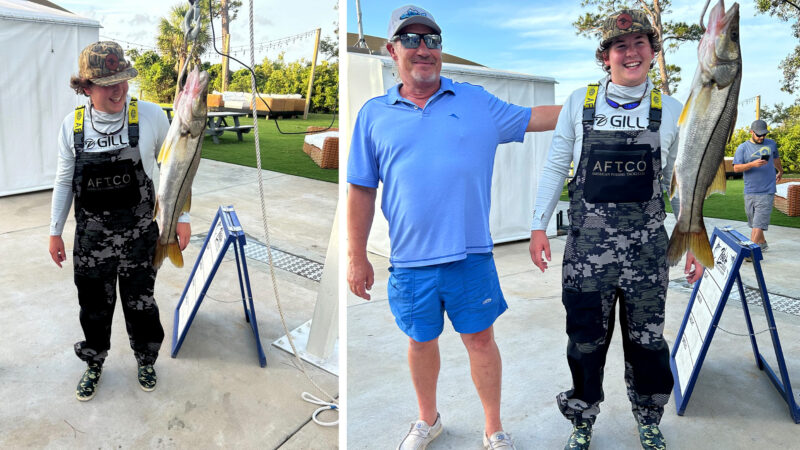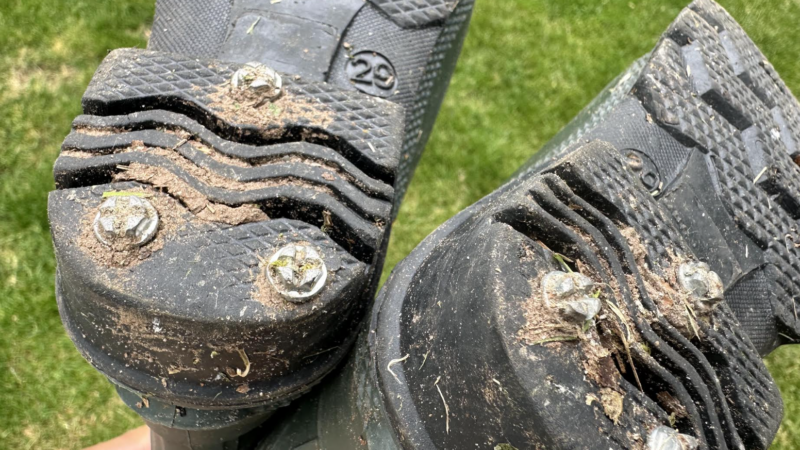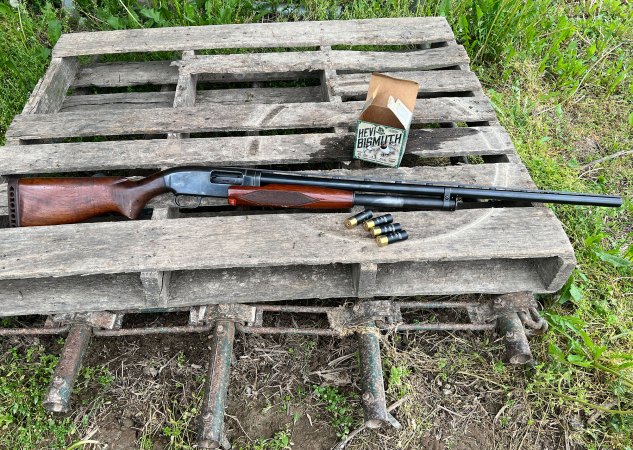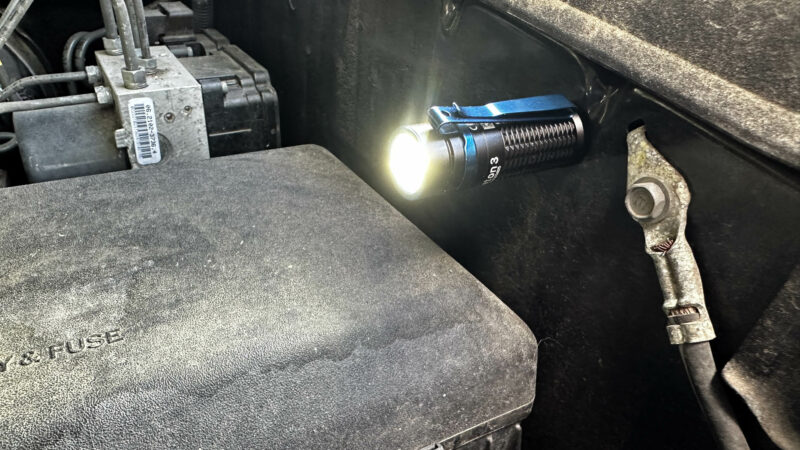How to Buy a Gun
We may earn revenue from the products available on this page and participate in affiliate programs. Learn More ›
Buying your first gun is exciting, especially if you have a hunt planned. But before you stroll into a gun shop or start scrolling through online retailers, it’s important to understand exactly how to buy a gun.
The Bureau of Alcohol, Tobacco, Firearms and Explosives intermittently updates the steps required to buy a gun as new developments in the firearm industry are announced. The ATF regulates this process nation-wide, so whether you decide to buy a gun online or in a shop, you’ll be required to fill out a form and pass a background check before you can legally possess a new firearm. There are some exceptions for private gun sales and additional gun-buying requirements in certain states (more on this below).
Depending on your personal history and where you live, the process of buying a gun can be simple or somewhat complicated. In this guide I’m not going to list every gun-buying regulation in every state. Instead, I’ll provide the general overview on how to buy a gun and then provide you with resources to research your state and local regulations.
Who Can Purchase a Firearm?
You can buy a gun as long as you’re an American citizen — or a “lawful permanent citizen” — and meet the minimum criteria to purchase a firearm, according to the ATF. Under federal law, shotguns and rifles can be purchased by eligible people 18 or older, and pistol buyers must be 21 or older.
Here are the federal regulations that explain who is prohibited from purchasing, shipping, or possessing a gun. In other words, if any of these items describe you, you cannot own or buy a gun:
- Any felons or persons who have been imprisoned for a year or more.
- Fugitives wanted by law enforcement.
- Someone addicted to unlawful controlled substances like meth, heroin, etc.
- Anyone deemed mentally incompetent to own or possess a gun is defined by the ATF as “mental defective or has been committed to a mental institution.”
- Illegal aliens or someone visiting the U.S. under a nonimmigrant visa.
- People who’ve received a dishonorable discharge from the U.S. Military
- People who have denounced their U.S. citizenship.
- Anyone under court orders that restrain them from “harassing, stalking, or threatening an intimate partner or child of such intimate partner issued after a hearing.”
- A person who has a misdemeanor crime of domestic violence conviction
- Anyone indicted for a felony crime may possess firearms and ammunition that are in their possession. Once convicted, you will no longer be allowed to buy new guns and ammunition and cannot possess anything previously purchased before the conviction.
Can You Buy a Gun for Someone?
The answer is yes, with some exceptions. It is illegal to straw purchase a firearm, which means buying a gun with the intent to give it to someone who cannot legally possess or purchase a gun.
But it is legal for parents to purchase firearms for their minor children, and it’s also legal to gift a gun to a family member or friend who lives in your own state, as long as they can legally possess and own it. Anyone under 18 must have their parent or guardian’s written permission to use the firearm for ranching, farming, target practice, or hunting. Be sure to research your state’s regulations before buying a gun for anyone.
Over-state-line transfers or sales require a Form 4473, meaning you cannot gift or sell a gun across state lines without filling out the form, which can be punishable by up to five years in prison and fines.
How to Buy a Gun Online or in a Gun Shop
To buy a gun online or at a gun shop, you will need to provide personal information, answer questions about your legal history, and pass a background check. You will also need a state or federally issued ID (like a driver’s license or passport) and you’ll likely have to pay to cover the FFL fee (usually $20 to $40). Here’s how that process works.
ATF Form 4473
Getty Images
Most gun purchases require that a buyer fills out an ATF Form 4473, which serves as a record of the gun purchase as well as a background check. When buying a gun from a shop with a federal firearms license, or FFL, you’ll be required to fill out Form 4473, also known as the ATF’s “Firearms Transaction Record.” The ATF requires that the form be completed at a gun dealer when a gun is purchased or transferred over the counter; this includes being the recipient of a raffle gun.
During this process National Instant Criminal Background Check System background checks are conducted by the Federal Bureau of Investigation or the state. They are submitted through Form 4473 by the FFL gun dealer before you can buy a gun. The NICS check typically takes about 30 seconds to a few minutes. However, some states require a mandatory waiting period before the purchase is finalized, like in California, which has a 10-day waiting period.
FFL dealers will provide you with the form in-house, but you can print off a current Form 4473 and fill it out at home if you like. Some gun stores will take your pre-filled form, while others will ask you to fill out one of their forms on a computer or tablet. Take your time, and if you make a mistake, just ask for another copy. (A new version of Form 4473 went into use on Feb.1, 2024, and you can find a detailed list of the changes here.)
The gun store should help you fill out the make, serial number, and a few other identifiers of the gun you’re buying. Be prepared to fill in the requested personal information, such as your address, social security number (optional), race, and U.S.-issued alien or admission number. You must also answer about a dozen questions related to your intentions for the gun and your criminal history. It’s pretty basic information, so don’t sweat it and answer honestly.
Errors on Form 4473
If you made a mistake on your Form 4473 and realize it only after the transfer has gone through, don’t worry. You can amend your form by photocopying the inaccurate version and adding to or revising on the photocopy. The seller should only make changes to Sections A, C, and E, and the buyer can only make changes to Sections B and D. The person making the corrections needs to initial and date them. The corrected photocopy needs to be attached to the original Form 4473 and retained as part of the seller’s permanent records. Some mistakes can result in a denial of firearm transfer.
Intentionally falsifying information on the Form is a felony punishable by up to 10 years in federal prison. Failing to maintain records on gun sales and personal records could also lead to felony charges and several years in prison or the revocation of the gun shop’s FFL license.
The only place you won’t have to fill out Form 4473 is at a local gun show or a private sale.
Gun Shows and Private Sales
This type of purchase is defined as buying a firearm from someone who is not a licensed dealer. This can be anything from your uncle selling you his old hunting rifle to buying a pistol at a gun show. For this type of a purchase, a Form 4473 is usually not required.
How to Buy a Gun at a Gun Show
Gun shows are typically held in areas like the local fairgrounds or convention centers. I grew up in South Dakota, where plenty of gun shows happen throughout the year. Many kids would buy homemade hunting knives while their dads might purchase a used hunting rifle that they wouldn’t otherwise be able to afford new at an FFL-licensed gun store.
In 1993, Congress passed the Brady Handgun Violence Prevention Act, which mandates that every FFL-licensed gun dealer conduct background checks on all potential buyers. The law exempts private transfers and sales, however, and the language of the law doesn’t specify whether gun shows are illegal or not. Gun shows are basically a market of private sellers.
It’s important to note that some FFL-licensed gun dealers sell at gun shows and require buyers to fill out Form 4473. It’s also important to know that recent initiatives by the Biden Administration have expanded the definition of who needs to be licensed in order to sell firearms, though the definitions around this are still pretty murky. So far, 20 states have banned the private sale of guns without background checks.
State Regulations for Buying a Gun
Every state has regulations on how to buy a gun, and restrictions on who is allowed to make the purchase. Learning every state’s gun control laws is exhaustive, so search your state’s gun laws using this website. While many states allow an adult U.S. citizen with a clean record to walk into a gun store with a driver’s license, pass a background check, and leave with a gun, other states and cities make it extremely difficult to purchase and possess a firearm.
For example, the state of New York doesn’t require a permit for anyone 18 and older to purchase a rifle or shotgun, but New York City does require a permit issued by the NYPD License Division to possess a firearm.
Buying Firearms Online
There are a handful of reputable online gun buying sites like guns.com and gunbroker.com. Not all states allow online gun purchases, but those that do still require you to go to a licensed firearms dealer. You purchase the firearm through the website and then it’s shipped to a local gun shop where you must fill out a Form 4473 before receiving it. Large retailers like Cabela’s and Scheels work the same way, but ship the gun to their own brick-and-mortar stores (the closest one to you), where you can pick up your new gun after a background check at the gun counter.
Tips for Buying Your First Gun
Do some research. It’s smart to have a good idea of which gun you want to buy before walking into a gun shop. Not all gun counter workers are experts. Do plenty of online research (like reading up on the best rifles, the best shotguns, and the best handguns) to find out which gun makes the most sense for your needs.
Set your budget. While there are a lot of affordable guns out there, firearm ownership can get expensive quickly. It makes sense to set a budget and stick with it. Remember that ammo, optics, and accessories (slings, cases, extra magazines, etc.) are required additional costs.
Have realistic expectations. Many first-time gun buyers tend to go with cheaper options. This is OK, but don’t expect high-end performance from your new $500 pump shotgun. If you can swing it, it’s often better to spend a little more for a more reliable, functional, and nice-looking firearm that will last you decades. (Read our review of best mid-priced rifles).
Beware of used guns. There is an endless sea of used firearms on the market; some of them are gems and others are junk. If you’re new to firearms, it can be hard to properly assess the quality of a used firearm. This goes beyond just dings in the finish. Some used guns have broken firing pins, wrecked barrels, and rusty actions. So either shop with an experienced shooter to help you sift through used guns, or just stick with new firearms.
Have a long-term gun buying plan. Everyone likes the idea of having one gun to do it all, but for most of us, this isn’t realistic. Identify the types of hunting and shooting you plan to do and then pick a few guns that will best suit those needs. Then buy those guns over the course of a few years. You’ll be much happier with a handful of semi-specialized firearms.
Range test when possible. If you have buddies who are hunters or shooters, take every opportunity to shoot their guns. Pay attention to how well they naturally fit you, or don’t fit you. It’s always best to shoot a version of the firearm you want to bu, before you buy it.
Read Next: You Just Purchased a Handgun for Personal Defense, Now What?
Final Thoughts on How to Buy a Gun
Before you buy a gun, make sure you can legally own a gun. Then check your local regulations including those of your state and city or county. From there, start doing research into which type of gun is best for you. Remember to take your time filling out the Form 4473, and remember to pick up some ammo, too.
The post How to Buy a Gun appeared first on Outdoor Life.






